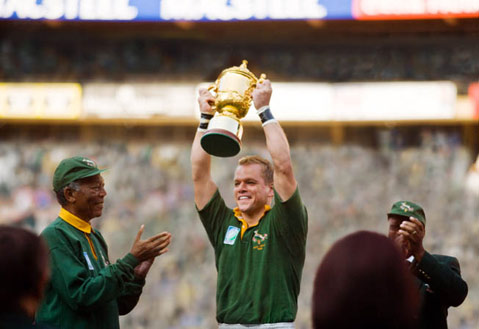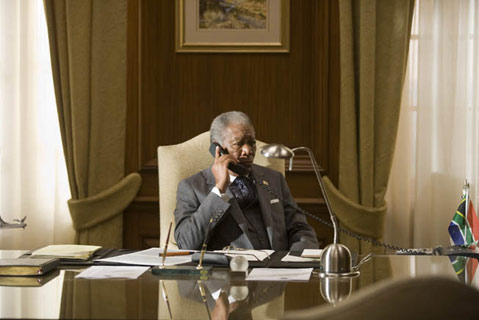South Africa’s Unifying Scrum
Invictus Screenwriter Anthony Peckham on His Homeland, Nelson Mandela, and Rugby

This weekend, audiences across America will begin applauding Invictus. The Clint Eastwood-directed film stars Morgan Freeman as Nelson Mandela on a quest to rally post-apartheid South Africans around the Springboks, the national rugby team so many had grown to see as the symbol of racial privilege. To do so, Mandela employs the aid of team star Francois Pienaar (played by Matt Damon), who must convince his teammates that they represent black South Africans as well as whites and then show his countrymen the same as they fight to win the 1995 World Cup. It’s perhaps one of the more uplifting moments in both sports and geopolitical history, and critics already are hailing it as one of the most important films ever made about South Africa.
Integral to its creation was screenwriter Anthony Peckham, who was born and raised in South Africa but now lives near Morro Bay because he’s “sort of a country bumpkin at heart.” Self-described with a laugh as a “25-year overnight success,” Peckham is riding a rather impressive wave of accomplishments right now, as he also helped pen the forthcoming Sherlock Holmes film and recently was hired to work on Deep Sea Cowboys. But he had a few spare minutes to chat with The Independent about Invictus, which will be screened on December 16 as part of the S.B. County Action Network’s S.B. Cannes series and followed by a panel discussion about the importance of youth sports in underserved communities.
How did you get involved with the film? A producer I’ve worked with before, Mace Neufeld, brought me John Carlin’s book proposal. John Carlin wrote the book about this event and I loved it immediately, at least because I was born in and grew up in South Africa. I left long before this event, but it touched me immediately. So we took it to Morgan Freeman, who basically is the only American actor who can play Mandela of that vintage. We didn’t know that they had seen the proposal and were looking for ways to get into it. It was a very happy circumstance. I told them my angle into the story and they paid me to write it. This makes it sound simpler than it was, but they gave my second draft to Clint Eastwood, because Morgan had been trying to get Clint to direct him in a movie, and Clint said yes. Once Clint Eastwood says yes, then all doors open before you.
When did you leave South Africa? Long ago, in 1981. I left in the darkest days of apartheid and basically because of apartheid. I didn’t know who Nelson Mandela was because he was a banned person back then. No image of him could be published and you could even be arrested for talking about him. It was a really draconian police state. All we knew was what the government told us, that he was the devil. I had to start learning about him once I left South Africa. I was 22.
How was writing about Nelson Mandela? It was very powerful. In a way, it allowed me to sort of revisit an incomplete part of my past and complete it, and to give back something to a country I love. So it was very powerful and very emotional writing it, which I hope will show up in the film. It was profound in a way that none of the other writing jobs I’ve had were profound.

I was also writing it during the Bush years and it’s really a film about leadership, and not just Mandela’s leadership either. So I was very aware that everything I was writing about-forgiveness and nation-building and the use of hope and the use of reconciliation-the opposite was happening in my new country at the time. We forget quickly, but a lot of what happened during the Bush era began to feel like the South Africa I had left-using fear as a tool to divide the nation and manipulating it in that way, which was all too familiar to me. Even though I don’t once mention Obama and I don’t mention Bush-I can’t, of course, this is supposed to be 1995-it all felt very relevant to me.
What was the end of apartheid like for you? To me, apartheid ended when they released Nelson Mandela from prison. : I remember very vividly watching his release at five in the morning here with my wife, who is also South African. We were crying like babies. We’d drunk the Kool-Aid of how powerful this police state was, so when we left, I honestly thought that I would never see the day that South Africa would become a further embittered, further polarized Stalinist state. It didn’t, of course, but everyone was very surprised when he was released. It was on live TV here for hours and hours. He walked out hand-in-hand with Winnie Mandela. It was quite stunning.
The film shows how sports can overcome serious social divides. Why is that? I think because everyone relates to sports, everyone relates to the immediate results of sports. And because athletes are so prominent in our society, what they do is very important. Whenever an athlete says, “I am not a role model,” my response is that part of the millions you earn means you are a role model, whether you like it or not. It’s a heavy burden, but that’s part of what you’re being paid for, especially these days when you’re paid so much.
In the film, though, it’s not as simple as that. Mandela had to fight his own people to keep the rugby team as it was. They all hated the rugby teams and its name, the Springboks, and they associated it with deep, bad apartheid. But Mandela knew that if he allowed a moment of revenge in changing the name, he would alienate an entire section of the nation that he needed help building with. He took on his own people, and you don’t really often see a leader do that these days. His own people were baying for symbolic blood, and he said, “No, you cannot.” And not only “you cannot,” but, “You must embrace them.” It’s slightly more complex than supporting a team. It’s supporting a team that everyone hated, and it worked.
I hope I show that this was not just some sort of naive blush of good feeling. It was really a sophisticated, canny political decision and he understood the symbolic importance of what he was doing at every second. He didn’t care whether it made him unpopular; he didn’t care whether he had to spend political capital doing it. His faith and commitment and forgiveness in turn inspired these guys to play out of their heads.
It’s a very cliched sports story and the underdog wins and unites a nation, but it’s true. I don’t apologize for the cliche. It’s very satisfying.
How does Invictus speak to the need for sports in underserved communities? It actually speaks to it very clearly. Part of what Mandela asked the Springboks to do in the buildup and during the World Cup is conduct coaching clinics in the poorest, most underprivileged areas. One of the major sequences in the movie shows the Springboks journeying into a township and conducting a rugby clinic for the day. What’s most important about it to me is the way in which it transforms the Springboks-helping people from underprivileged or deprived segments of your culture isn’t just good for them, it’s good for you. It’s another cliche, but when you give, you get, and that applies here, there, and everywhere else.
With reference to Santa Barbara and my country here, sports are about the healthiest recreational thing that a lot of these kids can do. It’s a great physical outlet and it teaches them all of the things that sports teach-teamwork, commitment to something larger than yourself, the pleasures of increasing your physical prowess and skills, the pride in self, and fitness. Plus, it’s just fun.
Did you play rugby growing up? We had to. It was compulsory. I just hated it. I was always the smallest guy on the entire field, and I used to get just slaughtered. I hated rugby. It’s not something I ever imagined I’d be writing about.
Have you returned to South Africa much? Not a hell of a lot because it’s so far, but every couple of years we go back. The change has been profound and, for a while, the change was miraculous. Things now seem to have settled into being more ordinary and slightly disillusioned. The last trip, I could tell people were disillusioned. But the trips before that were dynamic and amazing. To a person, every South African I met remembers the moment that this story talks about. : It didn’t last but for a moment-a nation at war embraced, and to me, that moment is what this movie is about. That’s what this story buys us, and that’s why I was so moved when I read about it.
4•1•1
Invictus, which opens this weekend in Santa Barbara theaters, will be specially screened on Wednesday, December 16, by the S.B. County Action Network, which will then host a panel discussion about the importance of youth sports in Santa Barbara’s underserved communities. Call 451-7608 or see sbcan.org for more info.



